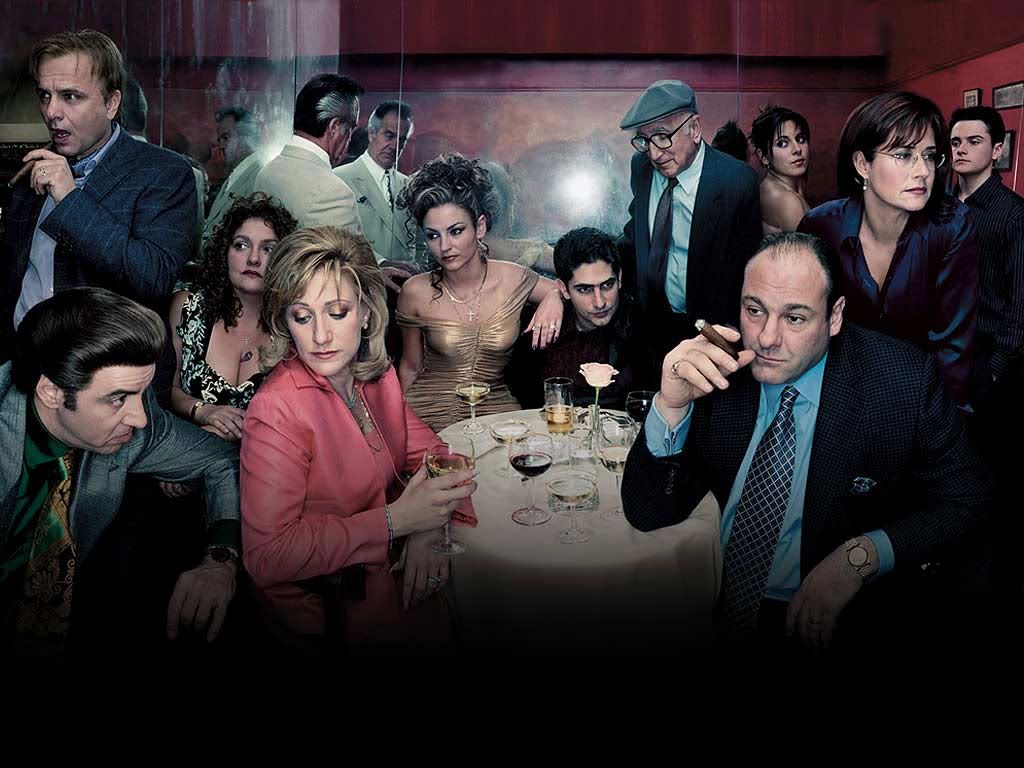A Bang-Up Finale For 'The Sopranos'

By Tom Shales
Monday, June 11, 2007; C01
It may have been the greatest double-take -- by the audience -- in the history of American television.
Millions of viewers who might have thought something had gone wrong with their TV sets or cable systems last night were mistaken. When the picture vanished at the end, the very end, of "The Sopranos" and the screen went black, that was producer David Chase's unorthodox and arguably ingenious way of ending the series and dispatching the Soprano family to eternity.
Chase set up the audience to expect an assassination, perhaps of the whole Soprano family: Tony, Carmela, Anthony Jr. and Meadow, who were sitting in a nostalgically old-fashioned diner about to order dinner. Menacing strangers entered. One went into the men's room, a seeming reference to a famous shooting in "The Godfather" in which a gun was hidden in a water closet.
And then -- while Journey's "Don't Stop Believing" played on a vintage jukebox and the family members made everyday small talk -- the Sopranos disappeared. No shots were fired. Whether they all would have been killed in the next scene, or lived several more years, or even made it to old age, was not specified.
These great mythic characters, who have captivated HBO viewers for nearly a decade, are now suspended in space and the national imagination forever.
An attentive HBO executive who was watching the episode for the second time said the last image, of Tony's face, was seen just as the words "don't stop" were sung on the jukebox. The episode was littered with references to mortality -- life, death, even the Apocalypse in a poem by William Butler Yeats. Only Chase could mix Yeats with the theme from "The Twilight Zone" and Simon & Garfunkel's "Cecilia" played as a cellphone chime and make it all jell.
As always, "The Sopranos" was a catalogue of references from the mundane to the profound, but the finale was the biggest guessing game of all: Who would die, who would live? Fans of the show hoping to see the evil Phil Leotardo get his saw one of the grisliest deaths in the series:
After being shot in the head, Leotardo falls dead to a gas station driveway. The SUV from which he'd emerged proceeds to run over his skull, crushing it and causing his two little grandchildren in their car seats to feel a little bump. It was macabre and bizarre in a way that only "Sopranos" could bring off.
Throughout the episode, Chase paid farewell visits to many of the regular "Sopranos" haunts, including the Bada Bing Club ("the Bing" to its mob owners), Satriale's Pork Store, and the Soprano home once the family felt safe enough to move out of hiding and back into it. In the end, Tony's problem with the feuding mob boss Leotardo was solved with the help of an FBI agent, who could in his way have been as morally corrupt as Tony in his.
But "The Sopranos" was not judgmental. It could be maddeningly neutral and even amoral; Tony Soprano, so powerfully played by James Gandolfini, could be a vicious killer one moment and dear old daddy the next. He loomed a giant figure from the first episode to last night's blistering and shattering finale.
Even posthumous characters showed up or were mentioned last night. Tony's malicious mother is still in his thoughts: "I never could please my mother," Tony said sorrowfully to his son's new therapist. Tony's own therapist, in an unlikely turn of events, dropped him as a patient last week, but now Tony's very, very confused son is seeking a shrink of his own. So the torch is passed to a new generation.
At a mental hospital, Tony visited the notorious old Uncle Junior, who was once instructed by Tony's own mother to kill him and later, in the throes of dotage and Alzheimer's, shot Tony in the stomach. Uncle Junior, dazed and deluded, exists somewhere between the living and the dead.
And Tony's nephew Christopher, whose life Tony himself ended in a recent episode, returned as a photo on the wall that a stray cat for some reason stared at obsessively -- even when the photo was moved to another spot.
HBO has had greater success with "The Sopranos" than any premium cable network has ever had with any series -- not just in terms of audience size but in terms of inspiring conversations, arguments, discussions and re-viewings of episodes.
Wherever two or three are gathered around a water cooler this morning, "The Sopranos" is likely to be a subject of discussion.
It's a classic now, and one that will live on for years.